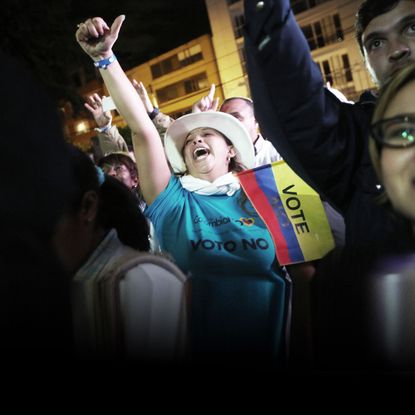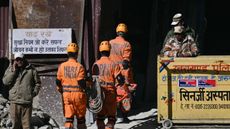Colombians reject deal to end Farc rebel war
Surprise referendum result risks prolonging armed conflict and plunging country into uncertainty

Voters in Colombia have moved against ratifying a peace deal between the government and Farc rebel forces, a shock referendum result narrowly rejecting the deal after four years of negotiations.
Polls "predicted yes would win with a comfortable margin of 66 per cent to 43 per cent", says The Guardian. But with counting complete from 98 per cent of polling booths, the No vote is ahead by 50.25 to 40.75 per cent, a difference of around 60,000 votes out of 13 million.
The result is "a surprise outcome that risks prolonging a 52-year-old armed conflict", says the Washington Post. It has also left President Juan Manuel Santos "politically crippled" and plunged the country into a period of uncertainty.
Subscribe to The Week
Escape your echo chamber. Get the facts behind the news, plus analysis from multiple perspectives.

Sign up for The Week's Free Newsletters
From our morning news briefing to a weekly Good News Newsletter, get the best of The Week delivered directly to your inbox.
From our morning news briefing to a weekly Good News Newsletter, get the best of The Week delivered directly to your inbox.
Santos said before the vote that there was "no plan B for ending the war". If he stands by his word, "the bilateral ceasefire will be lifted and the war will resume", says the BBC's Americas editor Leonardo Rocha.
However, Farc leaders believe the deal can be salvaged.
"The love we feel in our hearts is gigantic and with our words and actions [we] will be able to reach peace," they said.
Opposition to the peace accord was led by Alvaro Uribe, an influential former president who said the deal was "too soft on the Farc rebels by allowing them to re-enter society, form a political party and escape traditional jail sentences".
He and senior officials are now calling for the peace deal to be renegotiated, in defiance of Santos's insistence that a No victory would mean a return to war.
Create an account with the same email registered to your subscription to unlock access.
Sign up for Today's Best Articles in your inbox
A free daily email with the biggest news stories of the day – and the best features from TheWeek.com
-
 Scottie Scheffler: victory for the 'pre-eminent golfer of this era'
Scottie Scheffler: victory for the 'pre-eminent golfer of this era'Why Everyone's Talking About Masters victory is Scheffler's second in three years
By The Week Staff Published
-
 Crossword: April 20, 2024
Crossword: April 20, 2024The Week's daily crossword
By The Week Staff Published
-
 Sudoku hard: April 20, 2024
Sudoku hard: April 20, 2024The Week's daily hard sudoku puzzle
By The Week Staff Published
-
 Puffed rice and yoga: inside the collapsed tunnel where Indian workers await rescue
Puffed rice and yoga: inside the collapsed tunnel where Indian workers await rescueSpeed Read Workers trapped in collapsed tunnel are suffering from dysentery and anxiety over their rescue
By Sorcha Bradley, The Week UK Published
-
 'Extreme ironing' blamed for Ben Nevis board
'Extreme ironing' blamed for Ben Nevis boardTall Tales And other stories from the stranger side of life
By Chas Newkey-Burden, The Week UK Published
-
 Gaza hospital blast: What the video evidence shows about who's to blame
Gaza hospital blast: What the video evidence shows about who's to blameSpeed Read Nobody wants to take responsibility for the deadly explosion in the courtyard of Gaza's al-Ahli Hospital. Roll the tape.
By Peter Weber, The Week US Published
-
 Giraffe poo seized after woman wanted to use it to make a necklace
Giraffe poo seized after woman wanted to use it to make a necklaceTall Tales And other stories from the stranger side of life
By Chas Newkey-Burden, The Week UK Published
-
 Helicopter sound arouses crocodiles
Helicopter sound arouses crocodilesTall Tales And other stories from the stranger side of life
By Chas Newkey-Burden, The Week UK Published
-
 Woman sues Disney over 'injurious wedgie'
Woman sues Disney over 'injurious wedgie'Tall Tales And other stories from the stranger side of life
By Chas Newkey-Burden, The Week UK Published
-
 Emotional support alligator turned away from baseball stadium
Emotional support alligator turned away from baseball stadiumTall Tales And other stories from the stranger side of life
By Chas Newkey-Burden, The Week UK Published
-
 Europe's oldest shoes found in Spanish caves
Europe's oldest shoes found in Spanish cavesTall Tales And other stories from the stranger side of life
By Chas Newkey-Burden, The Week UK Published